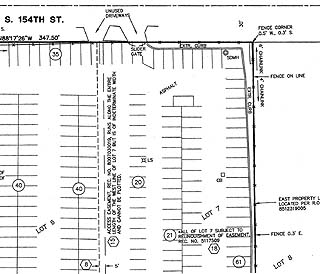
Surveys
DJC.COM
December 11, 2003
Don't get fenced in: Use a land title survey
Triad Associates

Image courtesy of Triad Associates
An ALTA survey of a local commercial property revealed fences encroaching over a boundary line.
|
Urban infill has become the buzzword for developers in the past few years. Since the Growth Management Act took effect, it is harder to find large parcels of pristine land suitable and ready for development.
Development is occurring in areas where other uses have existed side-by-side for some time, with a greater likelihood that encroachments may have occurred. Making good use of every foot of land affects the bottom line.
This all means that a land title survey, commonly called an ALTA survey, is being relied on more than ever to protect investments in real estate. How would you feel if you discovered that a project you had penciled out could only meet 90 percent of the required parking because of a boundary line conflict or the existence of an undocumented easement? If you were in the feasibility phase of a project, you might walk away with just the loss of some earnest money. If you were in the final engineering phase, you might lose a lot more than a night's sleep.
You can protect your investment in real estate by using an ALTA survey as part of your feasibility study for a project. Making an ALTA survey part of your discovery process is critical. It will disclose information on potential deal-breaker or “headache” issues so you can resolve them prior to buying a project.
| What is an ALTA survey? |
|
The American Land Title Association, the American Congress on Surveying and Mapping, and the National Society of Professional Surveyors, developed the Minimum Standard Detail Requirements for ALTA/ACSM Land Title Surveys (ALTA survey for short) as a uniform national standard. Although a national standard has been established, individual lending institutions often have additional requirements that need to be covered in an ALTA survey.
Lenders and title insurance companies often require an ALTA survey for the sale, transfer or refinancing of apartment projects, office buildings, commercial complexes, industrial parks and residential subdivisions. The sale of an individual home in the state generally doesn’t require an ALTA survey. A property owner or purchaser who is in the heat of a real estate or financing transaction will often request that an ALTA survey be performed with short notice and under a tight deadline. Hiring an experienced surveyor with the capacity to turn around quality work quickly is an important consideration. |
Having an ALTA survey will improve your position during real estate negotiations as well. An ALTA survey not only identifies conditions of public record that are disclosed by a title report, more importantly it may discover unrecorded rights by a third party that can reduce the value of a piece of property. These include:
- Easements, leases or other encumbrances.
- Encroachments onto or from adjoining properties.
- Errors and flaws in deeds or other legal instruments.
If requested, an ALTA survey also can identify matters affecting zoning issues or compliance with building setbacks.
Boundary line conflicts and unwritten easement rights can take time to resolve, often requiring a lawyer's assistance. Ideally, these should be resolved before you purchase a property. If these issues arise after you have purchased the property, they can create significant stress for you and delay your project schedule.
Also, any title or boundary conflicts need to be resolved prior to the recording of a final plat.
Boundary conflicts, encroachments and easement issues have adversely affected some of our clients' projects — reducing a project size from as little as a few square feet to as much as several acres.
As project sites become smaller, the margin for error decreases significantly. An ALTA survey prepared by a knowledgeable professional surveyor can help you make an informed decision about a project's potential value. It will give you necessary information to begin resolving issues that can impede the project from reaching its potential.
Greg Juneau, PLS, is a vice president and director of surveying at Kirkland-based land development consultant Triad Associates.
Other Stories:
- Insights Program looks at commercial real estate
- Town centers rediscovered after years of neglect
- Grocery stores cooking up more innovations
- Retail chic: Shopping centers with meeting places
- Development is changing; training should be, too
- When the government takes your property
- Are you paying too much property tax?
- A new corridor may be coming down the Pike
- Columbia City — the next hot spot?
- Yakima Valley real estate heats up
- Northwest taps into waterfront properties
- Interest rate hike could mean time to sell
- David A. Sabey
- James N. Carbone
- John Solberg
- Mic Dinsmore
- Mark A. Weed
- Portland's economic Rx: a biotech future
- The recovery train has left the station: Are we on it?
- Are hotels overbuilt or just overproposed?
- Tax credit program boosts low-income communities
- Debt can be good for nonprofits' projects
Copyright ©2009 Seattle Daily Journal and DJC.COM.
Comments? Questions? Contact us.